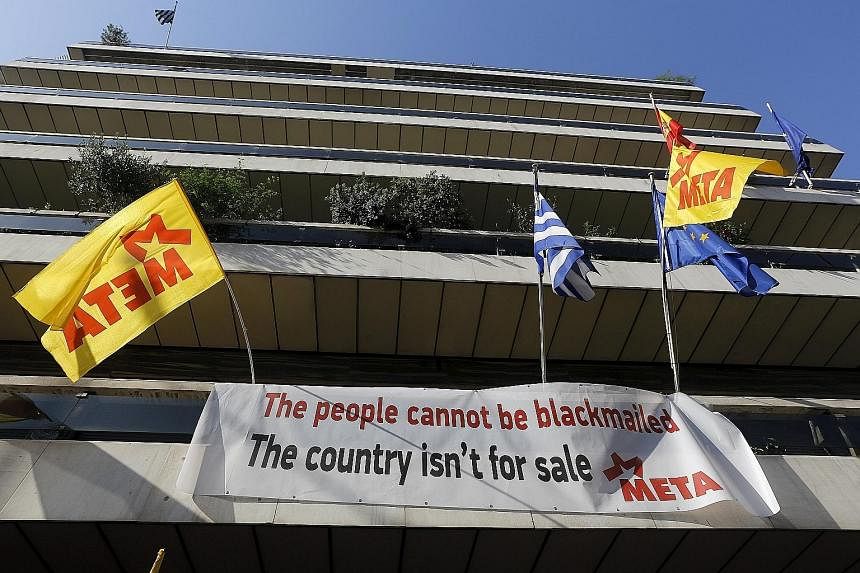EUROPEAN Union finance ministers meeting in Luxembourg today are likely to issue an ultimatum to Greece to accept a new economic austerity package in return for credits, or risk a default on its debts and eviction from the euro single currency.
But although Greek Prime Minister Alexis Tsipras vowed to "seek any compromise" over his country's refusal to accept further austerity, ties between Greece and its European partners are at such a low ebb that Finland's Prime Minister Juha Sipila, one of Greece's most hawkish creditors, admitted that "a miracle" is now needed to reach a settlement.
Mr Tsipras' far-left government, elected this January on an explicit pledge to terminate the austerity policies that Greece has had to follow since it first faced bankruptcy in 2010, has toned down its rhetoric. It now accepts that unless it settles its differences with the rest of the continent, Greece will run out of money to make a €1.6 billion (S$2.4 billion) debt repayment to the International Monetary Fund (IMF) at the end of this month.
Greece's creditors, who have already provided the country with an unprecedented €240 billion worth of bailout money (the biggest such package in modern financial history), have also accepted that with the Greek economy having shrunk by a quarter since the beginning of the decade and with 26 per cent of Greeks now jobless, a relaxation in the bailout provisions is in order.
In theory, a compromise is feasible, one which will demand that Greece cuts less of its government expenditure in return for further credits but still locks the country into a long-term economic reform programme that will prevent such a crisis from occurring again.
The sticking point is a European demand that Greece cuts its pension payments and raises its general sales tax in an effort to balance its budget; earlier this week, Mr Tsipras dismissed both demands as an attempt to "humiliate not only the Greek government... but humiliate an entire people".
Yet the Greeks have only themselves to blame for facing such tough choices. The EU demand to cut pensions, a move which will hit the most vulnerable, may seem heartless until one recalls that the proposed cuts would merely reverse the pension increases which the Greek government enforced earlier this year without consulting its creditors.
And the increase in sales taxes, which will undoubtedly affect the spending power of the population, is necessary because this is the only tax Greeks cannot avoid paying; despite promises by the authorities to crack down on tax evasion, income tax receipts are now at their lowest since the crisis began.
Mr Tsipras could have negotiated further compromises on both points: European creditors offered, for instance, to exempt electricity bills and medicines from sales tax increases.
But Mr Tsipras preferred instead to continue his confrontation with Europe.
"I'm certain future historians will recognise that little Greece, with its little power, is today fighting a battle beyond its capacity not just on its own behalf but on behalf of the people of Europe," he told lawmakers earlier this week, drawing loud applause.
European leaders are becoming increasingly convinced that Mr Tsipras is engaged in a game of brinkmanship and that, instead of accepting a deal, he is ready to risk defaulting on his country's debts - on the assumption that Europe will be so scared of the consequences that it will abandon its austerity demands at the last moment.
He may be gravely miscalculating on this point. For a number of European nations - and especially Germany without whose approval no compromise is possible - are required by their constitutional arrangements to put any deal with Greece to parliamentary approval.
So, if Greece wants the cash to honour its IMF obligations by the end of this month, a deal has to be reached now. It cannot be concluded on the day the debts fall due.
Today, EU finance ministers will be discussing issuing a final ultimatum to Greece, outlining what the country has to do to avoid eviction from the euro zone. European governments are also planning to abandon the traditional confidentiality of such discussions and issue the conditions publicly, in an effort to stop the Greek Prime Minister from misinterpreting what is on offer.
The reality is that Greece is not only running out of cash, it is also running out of friends. Mr Tsipras' biggest mistake was to ignore EU Commission president Jean-Claude Juncker who, as head of Europe's executive body, did his best to broker a compromise but now is no longer able to disguise his anger.
Mr Juncker spoke for many on the continent when on the eve of today's meeting, he expressed "sympathy for the Greek people, but not the Greek government".

